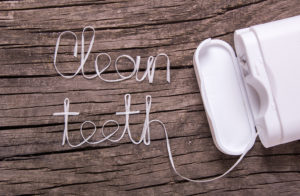14 Jan Why Flossing is So Important
 If we were to only brush our teeth and not floss, we can only clean about 70% of the surface area of our mouths. Moreover, flossing is an essential part of preventing periodontal (gum) disease because it disrupts colonies of bacteria forming at the gum line and removes debris and plaque from areas a toothbrush cannot reach. Flossing also stimulates the gums, which helps them stay healthy.
If we were to only brush our teeth and not floss, we can only clean about 70% of the surface area of our mouths. Moreover, flossing is an essential part of preventing periodontal (gum) disease because it disrupts colonies of bacteria forming at the gum line and removes debris and plaque from areas a toothbrush cannot reach. Flossing also stimulates the gums, which helps them stay healthy.
Flossing is a form of interdental cleaning. Any dentist will recommend daily flossing to stave off periodontal disease and keep debris and plaque from accumulating between teeth and along the gums. For optimal wellness, we recommend flossing everyday with floss that has the American Dental Association’s seal of approval.
The Incidence and Effects of Gum Disease
Gum disease is commonly caused by inadequate oral hygiene. This condition is common, too, with estimates indicating that nearly 80% of the adult population in the United States is at risk for developing periodontal disease at some point in their lifetimes.
Not only is gum disease common, it is very destructive and harmful to one’s health. If the condition is not mitigated with improved oral hygiene and timely professional treatment, it can advance to a stage that is not curable. Advanced, aggressive gum disease must be managed with professional treatment such as periodontal surgery and specialized prophylaxis like scaling and root planing.
Untreated or advanced gum disease can present a systemic oral infection that is capable of destroying all types of tissue including the jawbones. Since this disease attacks the support structures of teeth (gums and bone), it is the leading cause of adulthood tooth loss.
Preventing Periodontal Disease
The first step to preventing gum disease is to adopt a thorough oral hygiene regimen. People should brush their teeth at least twice a day and floss once a day. In addition to proper oral hygiene, patients should keep routine appointments with their dentist for checkups and cleanings.
If gum disease is detected early and treatment is received, people can prevent the disease from progressing to the point of permanent damage.
Call us today to schedule a checkup. During all appointments, our dentist and our staff look for signs of periodontal disease.
